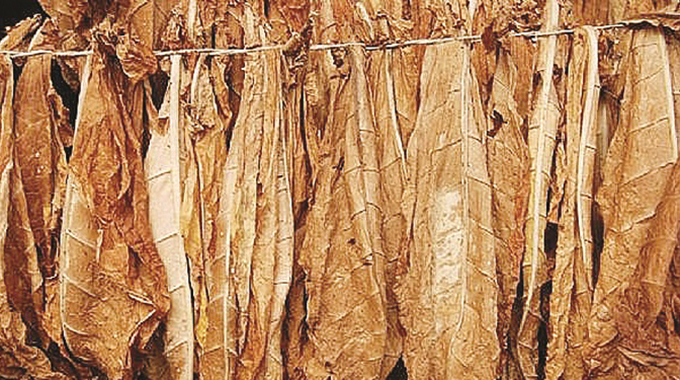Projected low tobacco volumes, a veiled blessing for growers

Obert Chifamba Agri-Insight
THE opening of the 2022 tobacco marketing season is now on the horizon! Expectations for firm prices are also running high, thanks to the anticipated reduced volumes.
Auction floors will get the ball rolling on March 30, with their contract floors following suit the following day — March 31.
Of course, contract floors will absorb the bulk of the golden leaf as 118 465 registered farmers are contracted, while the 4 530 self-financed growers will sell through the auction floors.
Ninety-five percent of Zimbabwe’s tobacco is now produced under contract system, while the outstanding 5 percent is from self-funded growers.
And just like what has been happening in the past two seasons, there will be strict Covid-19 regulations at all auction and contract floors to curb the spread of the disease.
But it is the projected good prices courtesy of the global drop in volumes that should get our farmers salivating.
Naturally, such a scenario will create increased demand versus limited supplies, which will improve the value of commodities on sale so the local tobacco industry’s heightened expectations should not be in vain.
Renowned tobacco producer, Brazil, is likely to be 80 million kilogrammes short of their usual production level because of drought, which created less competition for our farmers.
India on the one hand has also fixed its 2021/22 production of Flue Cured Virginia at 270 million kilogrammes, against 236 million kilogrammes the previous year while top quality tobacco grades for premium brands are likely to remain unchanged (US$3,5 – $US5, 40/kg) in prices compared to last season.
This should be good news to our farmers given that the high-end market for this grade has reached its ceiling in price increase.
The major market for these grades is in China and there are no indications to change prices upwards.
The fact that the world has lifted the Covid-19 restrictions coupled by uncertainty in the possibilities of other waves will give customers the leeway to stock up their tobacco, which increases demand and ultimately prices.
It is also refreshing to note that the Tobacco Industry and Marketing Board (TIMB) is making serious effort to ensure the marketing season is orderly and fruitful for both farmers and other value chain players.
TIMB has revealed that it recruited informers within farming areas to curb side marketing activities and is also working with relevant authorities to come up with a Statutory Instrument on side marketing.
The informers will be in all farming areas to gather information on the presence of illegal buyers.
It is, however, critical that the informers should be reliable people who will not abuse their jobs to either settle old scores by falsely accusing farmers or buyers of side marketing or be manipulated to pay a blind eye to illicit activities.
They should be people of high integrity and TIMB should remember that.
Besides relying on informers, TIMB will also be making regular radar sweeps on frequency of sales on grower numbers with a view to identify grower numbers perpetuating side marketing.
It will also be vital to check a grower’s delivered volumes against projected yields to see if there is some resemblance.
Respective individuals will be called to explain such sales and where chicanery is suspected, growers’ numbers will be blocked and suspended after which such criminal elements will be referred to the police for prosecution.
The solutions by TIMB need to be religiously monitored for efficacy so that the anticipated reduced volumes are not tampered with or put to waste by criminal elements but put to the correct and desired use.
The idea of naming and shaming individuals and contractors perpetuating side marketing is good but not deterrent enough.
A named and shamed offender may just brave the humiliation and still go back to his or her old ways clandestinely and in a more discreet manner.
TIMB may need to push for a stiffer penalty to ensure offenders are excluded from all goings-on in the industry for a specific period of time to deprive them of any earnings linked to the crop.
The idea of blocking growers’ numbers of convicted offenders may sound effective but the stark reality on the ground is that culprits can easily elude the hurdle by selling through other farmers’ growers’ numbers.
There should be a way of making sure such people feel the heat because they will be nursing their selfish egos while depriving millions of other people of livelihoods.
If offenders are contractors, then the idea of revoking licences sounds deterrent enough to stop them from taking part in such shenanigans.
Side marketing is in essence a default from agreed contractual obligations and involves the farmer selling his or her contracted tobacco to a third party yet the legally binding contractual agreement states that they shall sell their tobacco to the licenced contractor who provided them with inputs only.
It is in breach of SI 40 of the Tobacco Industry and Marketing Act [Chapter 18:20] when farmers sell tobacco produced under contract to another buyer other than the licenced one.
Side marketing also can also take place when a contracted farmer sells his or her tobacco to a licensed contractor other than the one who supplied him or her with inputs.
The exciting thing about this season is that farmers will be paid 75 percent of their sale proceeds in foreign currency with the remaining 25 percent in local currency, converted at the prevailing auction exchange rate on the day of sale.
The 75 percent will be paid directly into the growers’ foreign currency accounts and this is treated as free funds while 25 percent local currency will be deposited into the growers’ local bank accounts or e-wallets.
Although farmers would have been more comfortable with a retention figure higher than 75 percent, it is crucial for them to appreciate the fact that all sectors of the economy are going through a lean spell and direly need that foreign currency so they should work with what is availed to them.
Of course it is sad to note that charges for almost all services are now being quoted in hard currency but the reality on the ground is that the entire country has to share the little foreign currency that will be there when chance allows.
This season 122 995 growers registered with TIMB to grow the golden leaf compared to 145 000 during the same period last year.
Of the registered growers 607 were registering for the first time compared to 1 600 last season. The farmers planted 110 770ha of tobacco marking a decline of 11 percent from 125 176ha planted at the same period last year.
TIMB has aptly attributed the decline in registered growers to strict measures they implemented to ensure compliance to regulations.
There will be 33 contractors licensed to buy tobacco compared to 39 last year, 33 A class buyers compared to 31 last season while TIMB has also licensed suppliers for wrapping paper.







Comments